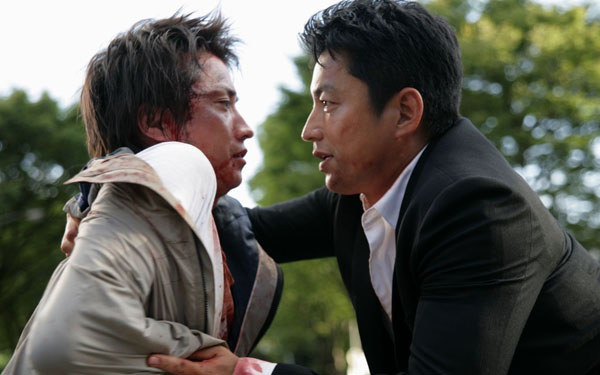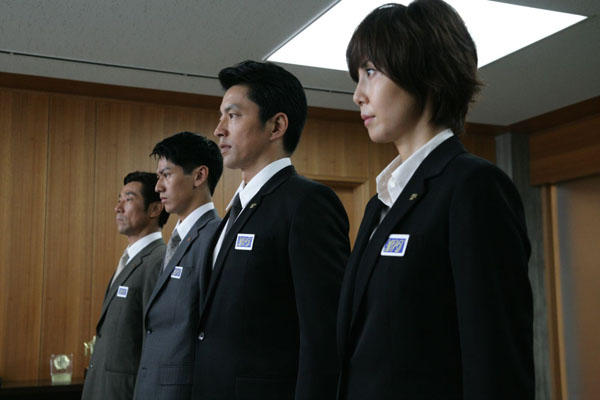“What happened to Takashi Miike?” asks James Hadfield in Time Out Tokyo. “How did the auteur responsible for the ingeniously twisted Audition and Ichi the Killer end up producing big-budget popcorn fodder whose main selling point is its technical competence? Wara no Tate might be the director’s most expensive production to date. Huge fleets of police vehicles are summoned, entire highways and stations closed off: a logistical effort that—by the penny-pinching standards of contemporary Japanese cinema—is almost Michael Bay-esque in its largesse. But it’s all so empty, so stupid, so utterly forgettable.”
Wara no Tate (Shield of Straw), selected to compete at Cannes next month and opening today in Japan, is “a police thriller based on Kazuhiro Kiuchi’s best-selling novel of the same name,” notes Jake Howell at Movie City News, where, by the way, he says its chances at winning the Palme d’Or are “zilch.” At any rate: “Takao Osawa (from Japanese TV show Jin) and Nanako Matsushima (I am Mita, Your Housekeeper) star as two cops tasked with escorting a convicted killer across Japan. Getting in the way are ruthless bounty hunters, eager to cash in on the head of the killer (played by Tatsuya Fujiwara, Death Note).”
In the Japan Times, Mark Schilling argues that “fans will recognize Miike’s characteristic affinity for extremes in Shield of Straw. A high-concept entertainment of a type beloved by the local industry, with a hyped-to-the-max plot that features death-defying heroics, the film pushes beyond its own cliches to an existential knife’s edge where the cop hero (Takao Osawa) is tested to the moral core of his being. And he is not the only one: The film is more notable for its high number of emotional meltdowns than its cars crashed and bullets fired. It’s as though Miike, notorious for his black comic violence, has decided to show how totally, even hysterically, serious he can be.”
Meantime, Midnight Eye is announcing a new book: “Re-Agitator: A Decade of Writing on Takashi Miike is the brand new book by Tom Mes, whose groundbreaking Agitator: The Cinema of Takashi Miike helped shape this filmmaker’s international career. Tom has been along for the ride ever since the notorious Audition turned heads and stomachs at the turn of the millennium. Re-Agitator collects more than ten years’ worth of his writing on Miike. From dusty film sets in Japan to festival intrigue on the Riviera, and from the straight-to-video ghetto to the stage, Mes covers the full scope of this unclassifiable filmmaker’s life and work—with the kind of detail and intimacy that only an insider can provide.”
Update, 5/2: “On Thursday, cast details for Takashi Miike’s Mogura no Uta were revealed along with a series of character images,” reports Kevin Ouellette at Nippon Cinema. The leads will be played by Toma Ikuta, Shinichi Tsutsumi, Riisa Naka, Takayuki Yamada, Takashi Okamura, and Yusuke Kamiji. “The film is based on a manga by Noboru Takahashi which revolves around an underachieving cop with a strong sense of justice named Reiji Kikukawa (Ikuta). Kikukawa is secretly tasked with infiltrating a large criminal organization in order to destroy it from the inside. Tsutsumi plays Akogi-gumi lieutenant Masaya Hiura, who goes by the nickname ‘Crazy Papillion.’ The actors were involved in intense wire action scenes while suspended 15 meters in the air. It reportedly took a month for the film’s stylist to track down the right fabric for Tsutsumi’s butterfly pattern suit.”
Updates, 5/20: “An enticing blockbuster concept gets a lackluster execution,” finds Variety‘s Peter Debruge. “Tighten the film to a sleek 80 minutes, and it could be a white-knuckle experience. Instead, the script plays head games, implying that there may be a traitor among the five cops. That action-lean, talk-heavy approach might still have been the way to go, as it was in the timeless Hollywood classic 3:10 to Yuma, though the characters would have had to be clearer and the actors stronger to pull it off. Instead, the governing motive here seems to be a code of honor, as decent cops risk their lives to protect an ungrateful scumbag—a realization that forces each of their resolves to waver at least once during the mission. It’s encouraging to find a strong woman on the team (played by Nanako Matsushima), though what happens to that character is one of the film’s greatest miscalculations.”
“Compared to Miike’s rigorous, searching and very underrated 3D samurai drama Hara-Kiri (2011)—itself a movie concerned with exploring codes of honor and the all-consuming lust for revenge—this is lowest-common-denominator gibberish that follows an extras-crowding, helicopter shot-abusing arc to a leaden finale,” writes Time Out New York‘s Keith Uhlich. “But there is an occasional glimpse of a deeper film, such as a scene in which the task force’s oldest member (Masatô Ibu, lending some welcome gravitas) quietly comes to terms with the dark impulses of human nature, his own included, after failing to talk down a distressed would-be assassin. Otherwise, this is a real slog—the first competition film I’ve seen with barely anything to recommend.”
“It is put together with technical competence, but is entirely cliched and preposterous, and it implodes into its own fundamental narrative implausibility,” agrees the Guardian‘s Peter Bradshaw.
The Playlist‘s Kevin Jagernauth: “Particularly with a filmmaker like Claire Denis shifted to the Un Certain Regard category or Ari Folman’s The Congress scuttled to the Directors’ Fortnight sidebar, many will be wondering what on Earth the Cannes selection committee saw in Takashi Miike’s Shield of Straw to have it play in Competition (especially considering it already opened a month ago in Japan). A b-movie potboiler at best, and indebted to countless other and much better films, this tedious, dumb, so-bad-it’s-almost-funny procedural is an overstuffed thriller that offers one single idea, and proceeds to beat it to death, without much of anything to say.”
“In the last four years,” notes the Telegraph‘s Robbie Collin, “Miike has made films as diverse as the stately samurai drama 13 Assassins; For Love’s Sake, a martial arts musical set in a high school; and the science fiction lark Zebraman 2: Attack on Zebra City. The man makes Ang Lee look like he is stuck in a rut…. Miike is in Christopher Nolan mode here: the film is full of grinding gears and clunking machinery, and not only in terms of its plot.”
“Set pieces include a kamikaze truck full of nitroglycerin, which certainly lights up the screen, but there is not as much ingenuity or inventiveness in the action sequences as you’d hope,” writes Catherine Bray for Time Out London. All in all, it’s a “should-be-more-thrilling thriller.”
“Sleek and engrossing, though awfully drawn out and short on psychological complexity, this is a straight-up police action thriller that adheres to a very familiar Hollywood template,” writes David Rooney in the Hollywood Reporter. “In fact, its chief enticement outside Japan may be as remake fodder.”
“There’s a nifty, preposterously entertaining 90-minute thriller buried in this two-hour-plus behemoth, and I suspect that we’ll see that film, in English, somewhere down the road,” writes Mike D’Angelo at the AV Club. “In the meantime, though, enough of it is discernible in the original version to provide an exhausting good time.”
“There are so many ways in which Takashi Miike’s Shield of Straw falls short of being the knockout that it could have been, it’s hard to know where to start,” sighs Brian Clark at Twitch.
Updates, 5/21: “For Miike, Shield of Straw represents a logical end point for his increasingly robust cinema,” writes Jordan Cronk at the House Next Door. “Within minutes the audience has been briefed on the case and thrown head-first into the pursuit, with the film climaxing early on with an incredible tanker-trunk chase that ends as explosively as one might expect. This is essentially Miike giving his fans exactly what they crave on the biggest canvas possible.”
“Sounds like fun?” asks Barbara Scharres at RogerEbert.com. “It is, up to a point…. ‘The American remake will be much better,’ stage-whispered the critic in the seat next to me.”
Maybe that critic was Nicholas Bell, who writes at Ioncinema that “it’s basically a nice looking genre rehash of 16 Blocks (2006) and it plays like something one could easily see remade with names like Mark Wahlberg or Olivia Wilde plopped into the lead roles.”
“The characters generally serve as types, rather than fully fleshed out beings with fully convincing motivations,” finds Chuck Tryon at Filmmaker.
“Add everything up and what you’re with looks displeasingly like second-rate Miike,” writes Adam Woodward at Little White Lies.
Update, 5/22: “Thierry Frémaux, the principal programmer at Cannes, has been credited with bringing more straight-ahead commercial genre titles, including action and horror-tinged action movies, into the mix,” notes Manohla Dargis in the New York Times. “The press hasn’t always been receptive and not necessarily because of art-film snobbism or because the movies are as risibly pretentious as Only God Forgives. The latest from the Japanese director Takashi Miike, Shield of Straw, might have received a less-hostile reception Monday morning if it were not in the main competition, where it has, bafflingly, been slotted. Consistently entertaining and totally implausible it’s the kind of cop film that a Hollywood B-movie studio would have churned out in the 1940s, though with a shorter running time than this one’s 2 hours and 5 minutes.”
Update, 5/25: “I’m becoming more visually careful.” The Notebook‘s Adam Cook interviews Miike.
Update, 6/3: For Filmmaker, Ariston Anderson culls ten lessons on filmmaking from her conversation with Miike.
Cannes 2013 Index. And you can watch over 100 films that have seen their premieres in Cannes right here on Fandor. For news and tips throughout the day every day, follow @KeyframeDaily on Twitter and/or the RSS feed. Get Keyframe Daily in your inbox by signing in at fandor.com/daily.






